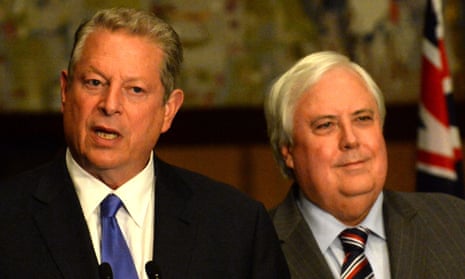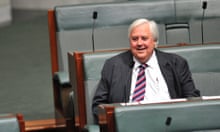Will the carbon tax be axed?
It would seem so. The government has 33 votes in the new Senate. Crossbench senators David Leyonjhelm, Bob Day and John Madigan have already said they will vote for repeal. With the Palmer United party’s three Senate votes the government has 39 votes it needs. Independent senator Nick Xenophon is also inclined to vote for repeal, but he wants a delay while he negotiates changes to the government’s climate change policy.
Has Palmer United party put any conditions on their repeal votes?
Yes, one condition. They will move an amendment to require power companies to pass to households and business the full savings they get from the carbon price repeal. The government believes this will do little more than legislate what power companies are already required to do, but the details remain sketchy so it is difficult to be sure.
What about the Coalition’s Direct Action scheme?
Palmer has said his senators will also vote against legislation amending the former government’s carbon farming initiative to expand it into the Coalition’s proposed $2.5bn “emissions reduction fund” saying it is a “waste of money”. Labor and the greens have also said they will vote against Direct Action. This provides the 38 votes needed to block the legislation. The government has previously said it could partially implement Direct Action without legislation, simply by appropriating the money in the budget supply bills.
Doesn’t this leave Australia without an overall policy to reduce emissions?
Pretty much. Direct Action was voluntary and didn’t impose any cap of carbon pollution anyway. The government may be able to give some grants to companies and organisations willing to reduce emissions, but without legislation it will not be able to impose what it calls “safeguards” which are supposed to prevent emission increases in other parts of the economy. It remains unclear how Australia will reach a target to reduce emissions by 5% by 2020.
So why did Al Gore stand up beside Clive Palmer?
Palmer did promise to vote to retain the $10bn clean energy finance corporation which provides loans to renewable and energy efficiency projects and also to vote against changes to the renewable energy target (RET) during this term in government. The RET has provided incentives for around $18bn worth of investment in renewables and the government is undertaking a review which appears likely to end with the RET being closed to new investments.
And when Gore got involved in the talks with Palmer, the mining millionaire was actually considering keeping an emissions trading scheme but temporarily setting the price at zero – an outcome that environmentally-minded people in the talks saw as “keeping the furniture”. Then Palmer’s senators insisted they had so clearly promised to back a repeal that they had to keep the pledge. This almost scuttled the Palmer-Gore duet, until Palmer promised he would support the re-introduction of the emissions trading scheme in the future, which put the joint press conference plan back on track.
Will Palmer ever be able to re-introduce emissions trading?
It would seem unlikely, now that Palmer has clarified this is not a condition for his senators supporting carbon tax repeal. Palmer’s press statement says he wants to insert the whole emissions trading scheme as an amendment in the climate change authority repeal bill. But he wants to keep the climate change authority, which would suggest he would vote against the repeal bill. Alternatively he could introduce separate legislation, but in any event the government isn’t likely to pass it through the lower house.






